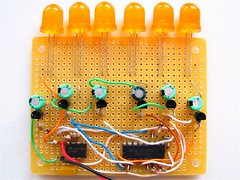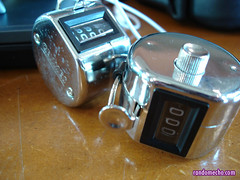Experiment Ideas 2010-11: Silence, class!, Web apps only, Social irritation, and the Labeling hack
 Friday, November 5, 2010 at 4:19PM
Friday, November 5, 2010 at 4:19PM I'm a collector of interesting, entertaining, and self-expanding things to try, so I thought I'd share a few from the Think, Try, Learn Experiment Repository. How about you - any experiments you've been doing or thinking of trying? The odder the better!
50's, Baby
At Results from the 50s Housewife Experiment Jen Byck did an experimented with living a classic 50's housewife role:
Over the course of two weeks, yours truly attempted to live the life of a 1950's housewife - through recipes and meal planning, a housekeeping schedule, a dedication to being frugal, and by maintaining specific beauty standards.
She reported that she gained a few pounds, saved money on groceries, spent more time with friends, and had a cleaner house. Check out her post to learn more. Good work, Jen! Anyone care to try it?
This reminds me of A. J. Jacobs' books The Year of Living Biblically: One Man's Humble Quest to Follow the Bible as Literally as Possible and My Life as an Experiment: One Man's Humble Quest to Improve Himself by Living as a Woman, Becoming George Washington, Telling No Lies, and Other Radical Tests. The essential pattern is to go back in history, pick a lifestyle different from our own, try it as best you can, then reflect and make changes based on what transpired. In other words, Think, Try, Learn! Book deal, anyone?
Silence is golden. And rare?
I went to a ten-day meditation retreat quite a while ago that was held in complete silence by the practitioners (though instructors spoke). This changed permanently my thinking about talking and the value of silence, including realizing how much control I subconsciously try to exert in conversations. The most recent inspiration was by a book I'm reading with my daughter called No Talking by Andrew Clements. In it a school of fifth grader boys challenge girls to not speak for two days. They make some practical exceptions based on the setting, such as making it OK to answer teacher questions, but on the whole I really enjoyed the detail Clements went into to explain how the experiment changed the kids' thinking and relationships. Anyone tried silence before? Did it make space for anything new?
Finally, in my piece Is there a data-driven personality?, reader dorijoyreader shares her experience trying it for one day. I really love her conclusion:
what did i learn from it? not much, compared with the feeling that i am doing something EXTRAORDINARY when i first spoke on sunday morning.
Want to get smarter? Shock yourself!
Electrical brain zap 'boosts maths ability' describes how:
A tiny electric current applied to the back of the head can significantly improve a person's mathematical skills for up to six months, a study has found.
I find these kinds of "do something to the body and see if it makes you smarter" types of experiments to be fascinating. Like the first person who saw a lobster and thought, "I wonder what THAT tastes like!", our species is brilliant at finding things to try on our plastic brains.
Working the Browser
Here's a somewhat geeky experiment: For seven days he worked exclusively in his web browser (see Seven Days In The Browser). The idea is to use the many in-browser applications available instead of their desktop equivalents. There's a ton of them, including Google Docs, which gives you writing, spreadsheet, and drawing. Anyone working soley on the net?
Edgy Social Experiments
"Early Show" Special Contributor Taryn Winter Brill conducted a tech etiquette social experiment to find out just how long it would take to try people's patience. Via "Early Show" Tests Tech Etiquette:
- Talking loudly on her phone on a busy commuter train,
- Texting or IM'ing with the accompanying chirping sounds,
- Holding up the line in a supermarket with her phone conversation, and
- In a movie theater she let her phone's ringing go on without answering.
I'm not sure the value of these experiments. The only surprises seemed to be how patient people were. I prefer the more helpful variety of social tweaking, such as leaving a quarter next to a vending machine or putting letting someone go in front of you in line. These spread good feelings.
Counting helping
In 7 Secrets to Maximize Social Media with Minimal Time, Quantified Self editor and fellow blogger Alexandra Carmichael shares her goal of helping 10 people every day. This one resonates with me because one of the most satisfying things I do is to connect two people who really need to know each other. I've had a handful of "home runs" that people regularly thank me for, and they are rich.
The Listen Log
Part of the joy of blogging is using it as an excuse to explore and learn (something we humans are configured to love). I don't even know what a "Listen Log" might be, but it seems like a personal development thing, like a gratitude log. How would it work? I came upon it at the completely unrelated Introducing the VRM ListenLog.
The "I'm am doing" mind hack
Being present is important, but I find it hard to be mindful when I'm busy or stuck in my head. To get yourself back into the moment while doing something common, such as drinking your morning coffee, try this re-centering technique: Simply tell yourself what you're doing right now in very simple language, such as "I am drinking chocolate" or "I am playing with my daughter." This is an example of the power of labeling - care to generalize the concept?









Reader Comments (8)
Before I did the experiment as well as during it, I evolved a set of symbols to make it easier and also i learned that there are basically five or so tasks that the brain does:
* Makes an important decision. e.g. early in the day, the primary goal was to get the car fixed as well as diagnose other problems, I to a fork in the road and right there I had to decide between going to a shop or heading to trak auto and talking to the guys there. it turned out to be a good decision.
Q...this would indicate when a question arose in my mind. E.g you suddenly realize that it might be important to know how many franchises so and so has set up in order to value this deal we are working on...These seem quite different than actually making a decision
~~~~~ this is like when you are doing a menial task like driving and your brain just relaxes and starts coming up with stuff..
! Creative idea, this is where you take out your ubiquitous capture tool
There was also other symbols for like meeting a goal or being tired. I guess I'll try to pull out my notes. It was really fascinating to try to trak the different sort of tasks ones mind goes through throughout the day..
It was interesting to plot what exactly my mind was doing; e..g driving from pt A to pt B sort of mindless repetitive behavior ~~~~~~~~~ And it's usually those times when you come up with creative ideas: I think I used a light bulb;
How about a JP IN MD blog - http://jpinmd.blogspot.com/ ? :-)
> Are you getting much in the way of a following on this blog? Is there carryover people from Matt's Idea Blog?
The experiment is still in progress! I'm in uncharted territory. The blog is focused around my TTL work, as I mentioned earlier. The Quantified Self posts are part of the plan too, so we'll see.
Thanks for commenting, JP.
http://www.nytimes.com/2010/11/16/science/16tier.html?_r=1&src=me&ref=general